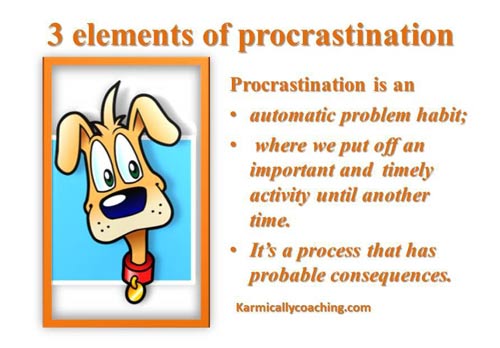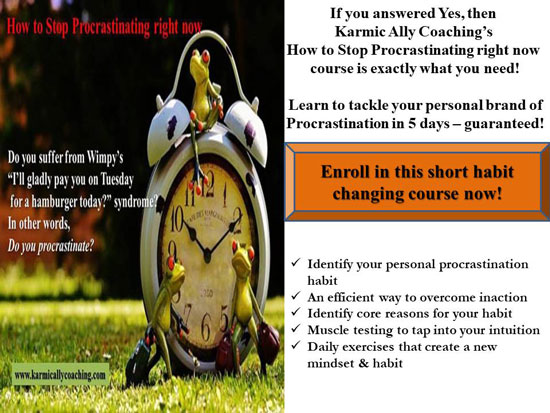
Procrastination is a complex personal challenge. For many, it’s an enigma associated with time management and our inclination to stall important actions ultimately adversely impacting our personal and professional lives.
In my Procrastination Quiz, we looked at different activities to ascertain whether a person was a habitual procrastinator along the deferment spectrum.
The good news is procrastination is a habit and habits can be changed with the right approach and attitude. We have a choice.
Procrastination is an equal opportunity habit that interferes with the productivity of people from every economic level, profession, age, or other demographic category.
That’s what I discovered for myself at Quora where I often answer questions on self-development. This time, there were 2 different people with different demographic profiles who wanted to get rid of their procrastination habit.
One was a student who admitted that he got easily distracted whenever he tried to read or study. His concentration level was less than a few minutes even when he was studying. He wanted tips to overcome this dilemma and find an efficient way to overcome procrastination.
The other person wanted to be a top performer at work. He was aware of the fact that when work got too hard, he’d cop out and enjoyed procrastinating. He wanted to change this time wasting behavior.
Practically everyone has at least 1 or more serious procrastination challenge to meet, especially workplace procrastination.
Procrastination is multifaceted
It’s more than a delay tactic. The concept isn’t as simple as you might think. There are 3 elements that make up procrastination and both readers who had asked for advice demonstrated these elements.
I mentioned earlier that procrastination was a habit. To be clearer, procrastination is an automatic problem habit; where we put off an important and timely activity until another time. It’s a process that has probable consequences.

We procrastinate because we have a negative perception about an anticipated activity.
This creates an urge to diverge by substituting something less relevant, and our procrastination is more often than not accompanied with thinking of justifications to delay action.
The decision to delay action brings immediate relief and hope but also reinforce the procrastination decision, making other procrastination decisions more likely in the future.
Have you ever had to do an important task and thought, “I’ll do this later when I feel ready.”? Or suddenly realized you have to take the dog for a walk, wash dishes or start cleaning the desk?
You’ve procrastinated and avoided the task. You can justify the urgency of the substituted tasks till the cows come home but the truth is, you’ve postponed the more important task.
More than a simple act of avoidance, procrastination involves a process of interconnected perceptions and thoughts, emotions and sensations and actions.
Choice comes into play when you recognize that you can either take corrective action or do nothing and hope for the best.
What’s an efficient way to overcome procrastination?
Procrastination is often a sign of deeper problems and useful in avoiding things that we know we need to do but want to justify not doing them. I don’t know anyone who chooses to develop a procrastination habit. If you are unsure try this Procrastination Quiz
Recognizing the tendency to procrastinate, for whatever reason, is half the battle.
Then it’s time to analyze the specific situations where you procrastinate and ask yourself some hard questions. What is the trigger for the procrastination?
It certainly isn’t a challenging task but some underlying reason. Is it fear of failure, perfectionism or a secondary benefit or pay-off? We procrastinate to put off things that make us uncomfortable.
Once you know the true underlying cause for procrastination and the key area where your exhibit this behavior, you can move forward and turn yourself into a top performer.
Perhaps better planning and chunking down tasks to acceptable bytes and building in some relaxation time might help as a starting point.
Think along those lines and then create a doable action plan to overcome your procrastinating tendencies.
I’ve found the Pomodoro technique to be useful when work feels like a huge mountain in front of me. You can learn more in my post Can a Tomato improve your Time Management?
Ultimately change is a choice, and it is our responsibility to take corrective action.
However change is also a process and is a habit that keeps us in our comfort zone. Would you like to change this inefficient and productivity reducing habit?
I suggest you take the How to Stop Procrastinating right now micro-course. Click here for the details or on the image below. The course is housed on my Karmic Ally Coaching Training website.
Do you know why you procrastinate on some actions and breeze through others? How do you keep this habit in check?
Do share your tips and experience in the comments section below.




 I adhere to the Certified Coaches Alliance Code of Ethics and Standards. A copy is available on request.
I adhere to the Certified Coaches Alliance Code of Ethics and Standards. A copy is available on request.
 Let's Talk through the Connect Form:
Let's Talk through the Connect Form: